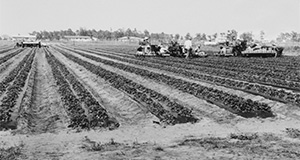Abstract
Mientras el clima de Florida lo hace ideal para producir una amplia variedad de cultivos, la intensidad del calor y la humedad también pueden representar peligros importantes para quienes trabajan en la agricultura. Con tres de los años más calurosos registrados en Florida en los últimos cuatro años (NOAA, 2019), los dueños de fincas, sus familias y empleados deben conocer los síntomas, el tratamiento y la prevención de las enfermedades relacionadas con el calor (ERC).
References
Association of Farmworker Opportunity Programs. (2010). Heat stress: Farmworker health and safety. [Trainer Guide and Workbook]. Washington, D.C. Retrieved from https://www.osha.gov/sites/default/files/2019-03/trainer_guide.pdf
Bureau of Labor Statistics. (2019, March 5). Fatal occupational injuries in Florida – 2018. U.S. Department of Labor. [News Release: 19-143-ATL]. Atlanta, GA. Retrieved from https://www.bls.gov/regions/southeast/news-release/2020/fatalworkinjuries_florida_20200225.htm
Center for Disease Control and Prevention [CDC]. (2008). Heat Related Deaths Among Crop Workers, United States, 1992-2006. MMWR, 57(24), 649-653.
Coris, E. E., Walz, S. M., Duncanson, R., Ramirez, A. M., & Roetzheim, R. G. (2006). Heat illness symptom index (HISI): A novel instrument for the assessment of heat illness in athletes. Southern Medical Journal, 99(4), 340–345. https://doi.org/10.1097/01.smj.0000209285.96906.0f
Costrini, A. (1989). Emergency treatment of exertional heatstroke and comparison of whole body cooling techniques. Medicine and Science in Sports and Exercise, 22(1), 15–18. https://doi.org/10.1249/00005768-199002000-00004
Grzywacz, J., Gonzales-Backen, M., Liebman, A., Marin, A., Trejo, M., Gudino, C., Economos, J., & Tovar-Aguilar, J. A. (2019). Attending to pesticide exposure and heat illness among farmworkers: Results from an attention placebo-controlled evaluation design. Journal of Occupational and Environmental Medicine, 61, 735–742. https://doi.org/10.1097/JOM.0000000000001650
Jacklitsch, B., Williams, W. J., Musolin, K., Coca, A., Kim, J. H., & Turner, N. (2016). NIOSH criteria for a recommended standard: Occupational exposure to heat and hot environments. Department of Health and Human Services, Centers for Disease Control and Prevention, National Institute for Occupational Safety and Health. Publication 2016-106. Cincinnati, OH: U.S. Government Printing Office.
Knochel, J. P. (1989). Heat stroke and related heat stress disorders. Disease-a-Month, 35(5), 306–377. https://doi.org/10.1016/S0011-5029(89)80002-1
Mac, V. V. T., & McCauley, L. A. (2017). Farmworker vulnerability to heat hazards: A conceptual framework. Journal of Nursing Scholarship, 49(6), 617–624. https://doi.org/10.1111/jnu.12327
Morano, L. H., Watkins, S., & Kintziger, K. (2016). A comprehensive evaluation of the burden of heat-related illness and death within the Florida population. International Journal of Environmental Research and Public Health, 13(6), 551–571. https://doi.org/10.3390/ijerph13060551
Murphy, D. (n.d.). Heat illness and agriculture. Pennsylvania State University College of Agricultural Science Cooperative Extension. Retrieved from https://extension.psu.edu/heat-illness-and-agriculture
Lugo-Amador, N. M., Rothenhaus, T., & Moyer, P. (2004). Heat-related illness. Emergency Medicine Clinics of North America, 22(2), 315–327. https://doi.org/10.1016/j.emc.2004.01.004
National Institute for Occupational Safety and Health [NIOSH]. (2016). Heat Stress – Heat Related Illness. Accessed on October 8, 2018. Retrieved from https://www.cdc.gov/niosh/topics/heatstress/heatrelillness.html
National Oceanic and Atmospheric Administration [NOAA]. (2019). Florida, average temperature, January–December 1998–2018. Climate at a Glance: Statewide Time Series. Retrieved on March 12, 2019, from https://www.ncdc.noaa.gov/cag/
Pacific Northwest Agricultural Safety and Health Center [PNASH]. (2017, June 1). Employer preparedness checklist for heat safety. Department of Environmental & Occupational Health Sciences. School of Public Health, University of Washington. Retrieved from https://deohs.washington.edu/pnash/sites/deohs.washington.edu.pnash/files/documents/HeatSafetyChecklist.pdf
Perez, M. (2016, May 19). Farmworker dies after complaining of heat exhaustion on bus ride back to Immokalee. Naples Daily News. Retrieved from http://archive.naplesnews.com/news/local/haitian-farmworker-dies-after-complaining-of-heat-exhaustian-on-bus-ride-back-to-immokalee-3335e8e7--380144811.html/
Perez, M. (2015, December 22). Report: Farmworker’s death should have been prevented. Naples Daily News. Retrieved from http://archive.naplesnews.com/news/crime/report-farmworkers-death-should-have-been-prevented-2738c212-4e00-109c-e053-0100007fd972-363310521.html/
Rao, P. (2007). Heat related illnesses: An occupational health concern for farmworkers. Farmworker Justice and Migrant Clinicians Network. Retrieved from https://www. migrantclinician.org/files/resourcebox/heat_monograph.pdf
Sheridan, S. C., & Lee, C. C. (2018). Temporal trends in absolute and relative extreme temperature events across North America. Journal of Geophysical Research: Atmospheres, 123(21), 11,889–11,898. https://doi.org/10.1029/2018JD029150
Sund‐Levander, M., Forsberg, C., & Wahren, L. K. (2002). Normal oral, rectal, tympanic and axillary body temperature in adult men and women: A systematic literature review. Scandinavian Journal of Caring Sciences, 16, 122–128. https://doi.org/10.1046/j.1471-6712.2002.00069.x

This work is licensed under a Creative Commons Attribution-NonCommercial-NoDerivatives 4.0 International License.
Copyright (c) 2024 UF/IFAS

